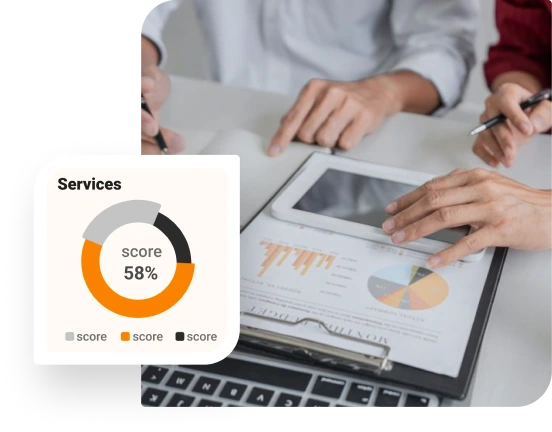Discover the transformative potential of AI tools for advisory services in MENA and unlock new possibilities for innovation and efficiency. Whether it is streamlining corporate processes, enhancing financial strategies, or rebuilding nations, the power of AI is undeniable. In countries like Syria, where reconstruction efforts are paving the way for a brighter future, AI tools for advisory services in Syria offer groundbreaking solutions to overcome challenges and drive sustainable growth. Keep reading to explore how applying these cutting-edge technologies by our experts at Professional Services is revolutionizing the advisory landscape across the region.

Table of Contents
Table of Contents

Artificial Intelligence (AI) has emerged as a game-changing force in the world of advisory services, offering unparalleled opportunities to enhance efficiency, drive innovation, and solve complex challenges. For businesses and governments in the MENA region, AI is not just a technological trend; it is a critical enabler of progress and transformation. This is especially true in post-war nations like Syria and Lebanon, where rebuilding efforts demand creative and adaptive solutions to revitalize economies, infrastructure, and communities.
AI tools for advisory services in MENA are transforming the way advisory companies deliver services, from streamlining corporate operations to providing data-driven insights for strategic development. In the context of post-war rebuilding, these tools hold the potential to address unique challenges, such as limited resources, complex regulatory environments, and urgent societal needs. This article delves into how AI is shaping our advisory services across corporate, financial, digital, and human resource domains, with a special focus on its role in the reconstruction of Syria and Lebanon.
Role of AI in Corporate Services
AI is revolutionizing corporate services by introducing efficiency, accuracy, and scalability into traditionally manual and time-intensive processes. AI tools for advisory services in MENA, where businesses face diverse challenges such as regulatory compliance, market volatility, and resource constraints, are providing tailored solutions to streamline operations and foster growth.
One of the most significant applications of AI in corporate services is automation. Tasks such as document management, payroll processing, and compliance tracking can be handled efficiently by AI-driven systems, reducing errors and freeing up valuable time for human resources to focus on strategic initiatives. Additionally, AI-powered analytics tools enable businesses to monitor market trends, assess risks, and make data-driven decisions, ensuring they remain competitive in a rapidly evolving economic landscape.
In post-war countries like Syria, the adoption of AI in corporate services is proving invaluable. Companies engaged in rebuilding efforts can leverage AI tools to restructure and optimize their organizational frameworks, ensuring they operate effectively despite limited resources. For instance, AI-based project management tools can help coordinate large-scale reconstruction projects, enhancing collaboration and ensuring timely delivery of outcomes.
AI’s ability to integrate with corporate ecosystems offers a transformative edge, enabling businesses to not only survive but thrive in challenging environments. By harnessing the power of AI tools for advisory services in MENA, we at Professional Services can provide our clients with the tools needed to rebuild, innovate, and succeed.
AI in Financial Advisory Services
AI has become a cornerstone of innovation in financial advisory services, offering unparalleled precision, efficiency, and scalability. AI tools for advisory services in MENA, particularly in post-war nations like Syria and Lebanon, are unlocking new opportunities to stabilize economies, attract investments, and manage financial complexities with greater accuracy.
One of the key applications of AI in financial advisory is AI-driven predictive analytics. By analyzing vast datasets, AI-powered tools can identify patterns and forecast economic trends, allowing businesses and governments to make informed decisions. These tools are especially vital in rebuilding economies, where precise financial forecasting can determine the success of infrastructure projects, market recovery, and investment strategies.
AI also excels in portfolio management, enabling financial advisors to provide clients with tailored recommendations based on real-time data. AI tools powered by machine learning can evaluate risk, optimize asset allocation, and suggest investments that align with specific goals, ensuring businesses and individuals achieve financial stability and growth.
In post-war Syria, where transparency and rebuilding trust in financial systems are critical, AI-driven fraud detection systems play a vital role. These AI tools use advanced algorithms to identify anomalies in financial transactions, reducing the risk of fraud and enhancing confidence among stakeholders.
By integrating AI tools into financial advisory services, we can empower our clients to navigate complex financial landscapes with agility and foresight. From stabilizing economies to fostering sustainable growth, AI is redefining how financial expertise is delivered in the MENA region.
Digital Transformation Through AI
Digital transformation has become a necessity for organizations striving to remain competitive in a rapidly evolving global landscape. AI tools for advisory services in MENA are driving transformative changes, since businesses and governments in this region face unique challenges such as diverse regulatory environments and varied digital readiness. Post-war nations like Syria and Lebanon, in particular, are leveraging AI tools to modernize legacy systems, enhance operational efficiency, and rebuild digital infrastructure for a sustainable future.
AI plays a pivotal role in enhancing digital workflows by automating routine tasks, optimizing resource allocation, and enabling seamless collaboration across teams. For example, natural language processing (NLP) tools are transforming how organizations manage customer interactions by powering intelligent chatbots and virtual assistants. These tools can provide round-the-clock support, improve customer satisfaction, and reduce operational costs.
Moreover, machine learning (ML) algorithms enable organizations to analyze vast amounts of data, derive actionable insights, and predict future trends. This capability is crucial during rebuilding phases in countries like Syria, where understanding market conditions and resource needs can accelerate recovery efforts. AI tools for advisory services in MENA also assist in digitizing paper-based processes, helping institutions transition to more secure, efficient, and accessible digital platforms.
The scalability of AI-driven solutions is another major advantage. By adopting AI-powered cloud platforms, organizations can rapidly expand their operations while maintaining cost-efficiency. This is particularly beneficial in post-war regions, where rebuilding efforts often require flexible and scalable technology solutions to accommodate fluctuating demands.
Incorporating AI into digital transformation efforts allows us to offer comprehensive support to our clients, enabling them to embrace innovation, overcome challenges, and thrive in a digitally driven world.
Process Improvement & Automation with AI
AI is a driving force behind process improvement and automation, enabling organizations to optimize efficiency, reduce costs, and improve the quality of their operations. AI tools for advisory services in MENA provide businesses with innovative solutions to streamline workflows and enhance productivity. In post-war nations like Syria and Lebanon, such technologies are indispensable in rebuilding industries and infrastructure while maximizing the use of limited resources.
One prominent application of AI in process improvement is Robotic Process Automation (RPA). RPA uses AI-driven bots to handle repetitive and time-consuming tasks, such as data entry, invoice processing, and customer onboarding. By automating these tasks, organizations can minimize human error and focus their resources on strategic, high-value activities.
AI tools for advisory services in MENA are also instrumental in process monitoring and optimization. Machine learning algorithms can identify inefficiencies within workflows, recommend improvements, and even predict potential bottlenecks. For instance, in a manufacturing or construction context, AI-powered predictive maintenance tools can analyze equipment performance and identify maintenance needs before failures occur. This ensures continuity in critical rebuilding projects, a key priority in countries like Syria and Lebanon.
Moreover, AI’s ability to integrate with other technologies enhances its effectiveness in automation. For example, combining AI with IoT devices enables real-time monitoring of supply chains, ensuring smoother logistics and resource allocation. This capability is especially beneficial for rebuilding infrastructure, where precise coordination is critical to meeting tight deadlines and budgets.
By implementing AI-driven process improvement and automation solutions, we can empower our clients to transform operations, adapt to changing demands, and achieve sustainable growth. These advancements are not just about efficiency—they represent a pathway to resilience and innovation in challenging environments.
Role of AI in Property Protection and Security
AI is redefining property protection and security by providing intelligent, proactive solutions to mitigate risks and safeguard assets. In the MENA region, where geopolitical instability and rapid urbanization pose significant challenges, AI-powered tools are becoming essential for addressing complex security needs. In post-war nations like Syria and Lebanon, these technologies are playing a critical role in rebuilding efforts by ensuring the safety of people, infrastructure, and investments.
One of the most impactful applications of AI in security is the deployment of AI-driven surveillance systems. These systems use computer vision to monitor environments in real time, detect anomalies, and alert authorities to potential threats. Advanced facial recognition and behavior analysis technologies enhance the ability to identify risks, improving response times and preventing incidents.
AI tools for advisory services in MENA also play a significant role in risk assessment and disaster management. Predictive analytics tools can evaluate historical data, weather patterns, and socio-economic factors to identify vulnerabilities and recommend preventative measures. This capability is invaluable in post-war Syria and Lebanon, where rebuilding efforts often contend with the risks of natural disasters and potential conflicts.
Another key application is in cybersecurity, which is critical as organizations transition to digital operations. AI-powered cybersecurity tools can detect and counteract cyber threats in real time, protecting sensitive data and ensuring the integrity of systems. These AI tools are particularly relevant in the context of post-war reconstruction, where the digitization of public and private sectors is essential for sustainable development.
By integrating AI tools into property protection and security strategies, we can offer tailored solutions to address the unique needs of clients in the MENA region. These technologies not only enhance safety but also provide the confidence necessary for businesses and governments to invest in rebuilding and growth.
HR Transformation Through AI
AI is reshaping human resources (HR) by automating tasks, streamlining recruitment, and enhancing workforce management. AI tools for advisory services in MENA address labor market challenges and skills gaps, while in post-war nations like Syria and Lebanon, they support rebuilding a resilient workforce.
AI-driven recruitment tools accelerate hiring by matching candidates to roles and conducting preliminary screenings via chatbots. These tools efficiently source skilled professionals, essential for rebuilding efforts. Similarly, AI-powered platforms personalize employee training, fostering targeted upskilling in industries like construction and technology, vital for economic recovery.
For workforce management, AI provides real-time analytics on performance and retention, helping organizations adapt to changing conditions. AI-powered predictive analytics further support workforce planning, a critical need in post-war environments.
By integrating AI into HR strategies, organizations can build agile, future-ready teams that address immediate challenges while positioning themselves for long-term success in MENA’s evolving economy.
Strategy Development Powered by AI
AI is transforming strategy development by enabling data-driven decisions, scenario modeling, and adaptive planning. AI tools for advisory services in MENA and in complex post-war settings like Syria and Lebanon offer critical support for creating resilient and sustainable strategies.
For data-driven insights, AI processes vast datasets, uncovering patterns in market trends, consumer behavior, and competition. This capability bridges gaps in fragmented data in post-war regions, offering reliable insights to guide reconstruction and investment strategies.
Concerning scenario modeling and risk management, AI tools simulate various scenarios, predicting outcomes of factors like economic shifts or political instability. For businesses in rebuilding economies, these simulations assess risks and create contingency plans, enhancing adaptability and resilience.
For ongoing monitoring and adjustment, AI continuously tracks KPIs and market changes, allowing real-time strategy adjustments. In rapidly evolving environments like Syria and Lebanon, this ensures strategies remain effective amid unexpected challenges.
By leveraging these AI tools for advisory services in MENA, we can help organizations navigate uncertainties, seize opportunities, and manage risks, driving growth in MENA’s dynamic economic landscape.
AI’s Impact on Post-War Rebuilding in Countries like Syria and Lebanon
The post-war rebuilding of Syria and Lebanon faces challenges like damaged infrastructure, economic instability, and social complexities. Our AI tools for advisory services in MENA are accelerating reconstruction and promoting sustainable development, making them indispensable for governments, businesses, and NGOs navigating these obstacles.
- Infrastructure and Urban Planning: AI supports infrastructure rebuilding by optimizing city layouts, identifying ideal locations for critical facilities, and monitoring construction progress. For example, AI tools in Lebanon help ensure quality control in rebuilding residential and commercial properties.
- Efficient Resource Allocation: In resource-scarce Syria, AI forecasts demand, identifies supply chain issues, and prioritizes projects, ensuring materials, labor, and finances are used efficiently.
- Economic Recovery: AI-powered tools assist economic recovery by analyzing macroeconomic trends, assessing investment risks, and identifying market opportunities, helping businesses and governments rebuild resiliently.
- Community and Social Services: AI enhances education, healthcare, and social services through remote learning platforms, mental health support, and efficient delivery systems, prioritizing the needs of marginalized groups.
- Governance and Transparency: AI-driven systems monitor aid distribution, public spending, and corruption risks, fostering transparency and rebuilding trust in governance—a cornerstone for social stability.
By integrating AI across these sectors, we empower stakeholders to rebuild infrastructures and societies effectively, ensuring Syria and Lebanon emerge stronger and more resilient.
Embracing AI for a Brighter Future in MENA
In conclusion, AI tools for advisory services in MENA have the potential to revolutionize our services, offering innovative solutions to challenges in corporate services, financial advisory, digital transformation, process automation, property protection, HR transformation, and strategy development. For post-war nations like Syria and Lebanon, AI is not only a tool for rebuilding but a critical enabler of resilience, economic growth, and social stability.
By harnessing the power of Artificial Intelligence, we can help organizations navigate the complexities of post-war recovery and drive long-term success. The future of MENA lies in the intelligent application of AI, ensuring that businesses and governments are equipped to face challenges head-on, build stronger infrastructures, and foster sustainable growth.
Embrace AI tools today, and pave the way for a more prosperous and resilient future in MENA, especially in countries like Syria and Lebanon, where rebuilding efforts are both urgent and transformative.
FAQs about AI Tools for Advisory Services in MENA
AI enhances decision-making, optimizes resource allocation, and automates processes, enabling organizations to operate more efficiently in MENA’s dynamic environment.
AI aids in infrastructure planning, resource allocation, economic recovery, and governance transparency, addressing the unique challenges of rebuilding in Syria and Lebanon.
Yes, AI-driven platforms support recruitment, upskilling, and workforce analytics, helping rebuild a skilled and resilient workforce.
AI analyzes market trends, forecasts economic scenarios, and identifies investment opportunities, enabling better financial planning and risk management.
Absolutely, AI-driven systems provide real-time monitoring, predictive analysis, and enhanced security measures to safeguard assets.
AI accelerates digital initiatives by streamlining operations, automating workflows, and offering data-driven insights, fostering innovation in businesses.
AI ensures transparency by monitoring aid distribution, tracking public spending, and mitigating corruption, rebuilding trust in institutions.
Yes, AI solutions can be tailored to meet the specific needs of small, medium, and large enterprises across various sectors.
AI supports data-driven planning, scenario modeling, and adaptive strategies, helping organizations navigate uncertainties and seize opportunities.
Construction, healthcare, education, and finance see significant benefits, with AI optimizing processes and driving recovery efforts.
Our Insights
Our Insights are designed to give you a different experience when working with your team or personally



Start now![]()
Get in touch


